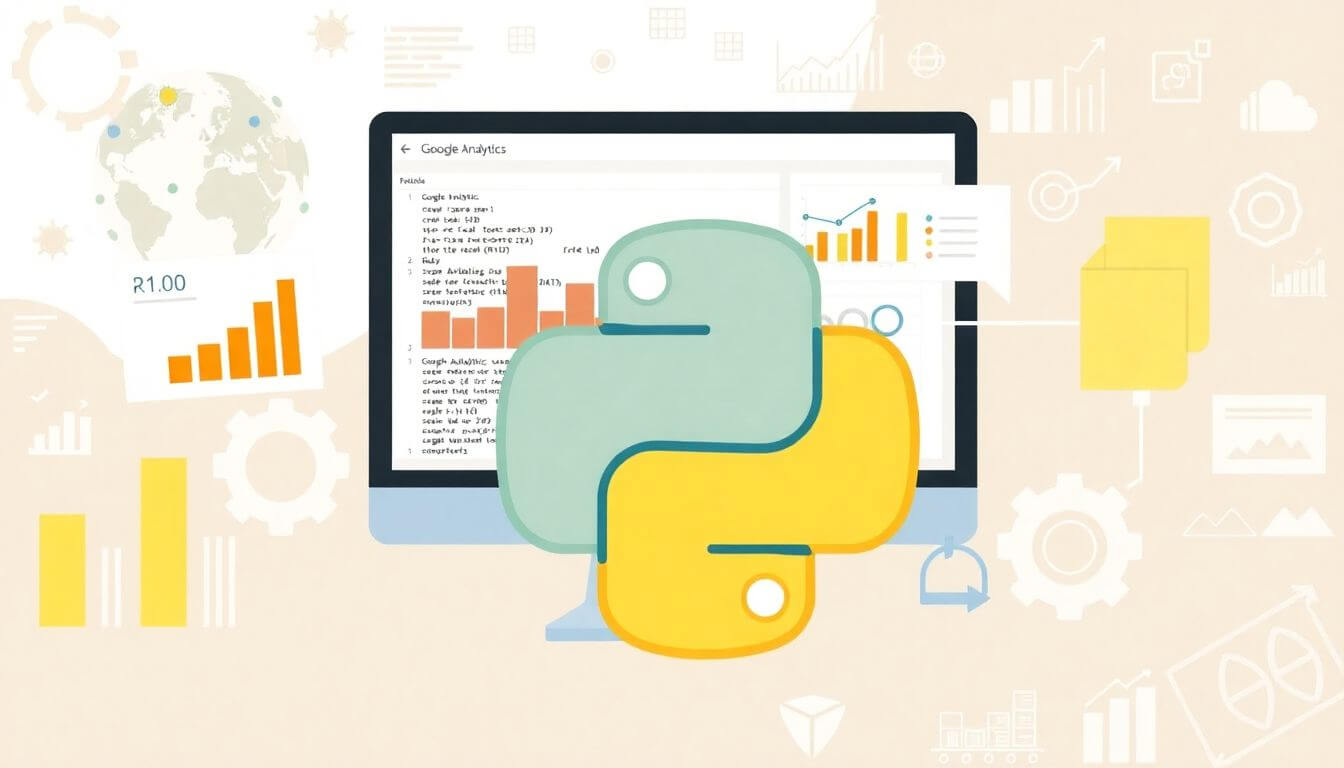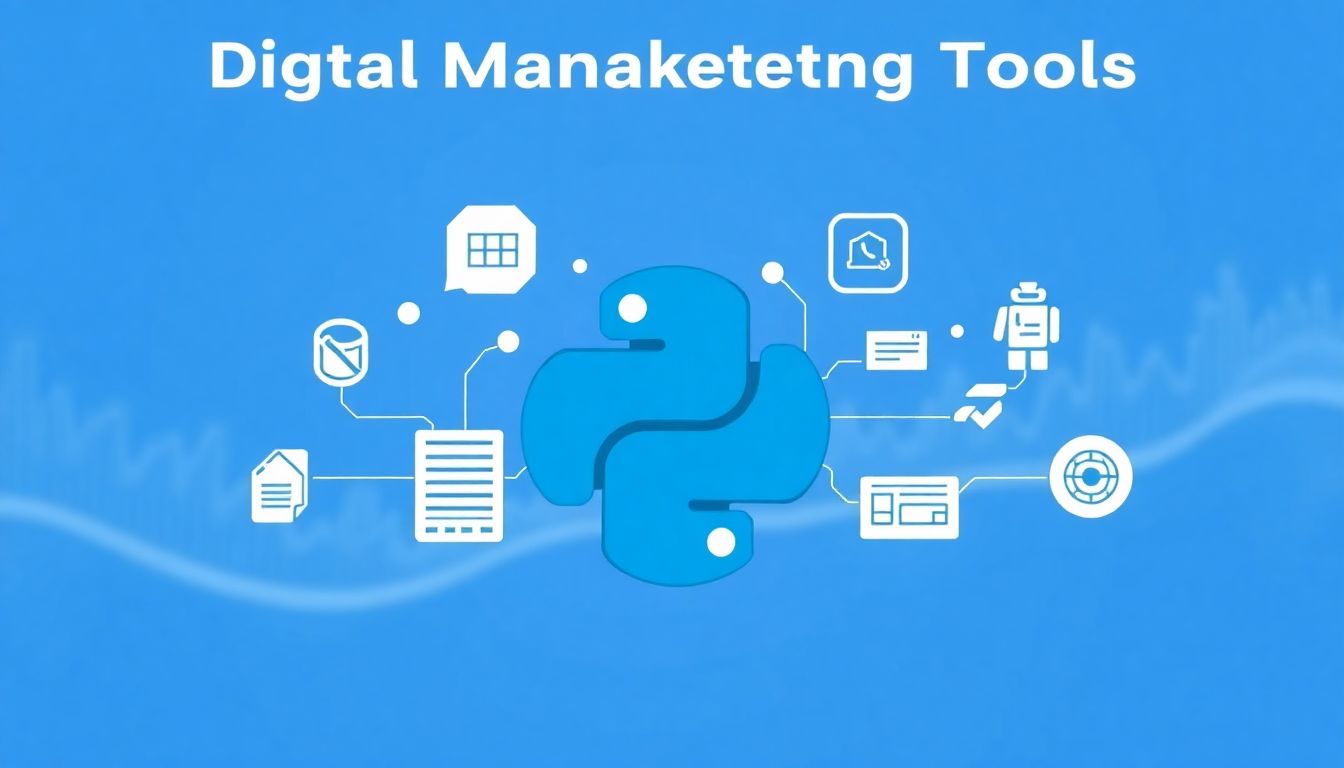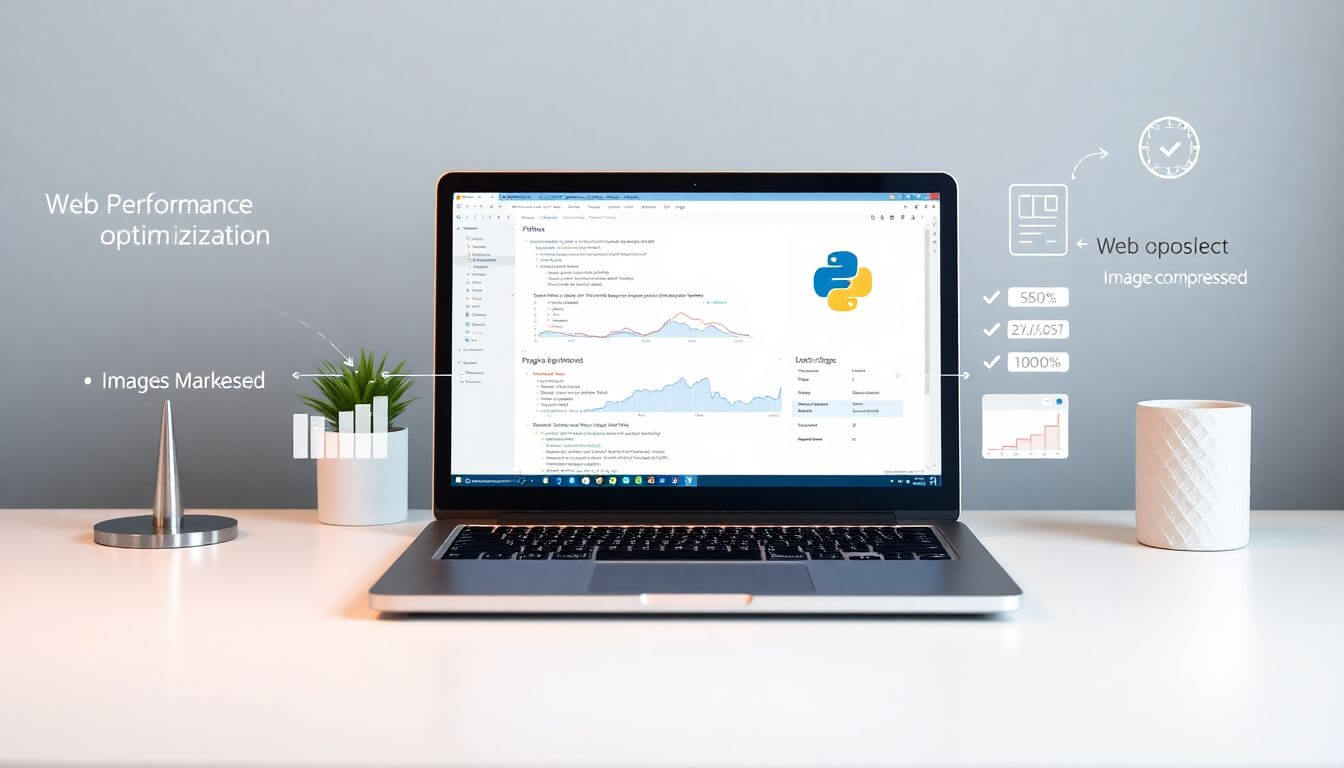Python For Digital Marketers- Automating Seo And Analytics Tasks

In today’s fast-paced digital landscape, marketers are always on the lookout for tools and technologies to simplify processes and maximize efficiency. Python, often considered the favorite programming language among programming geeks, has emerged as a powerful ally for digital marketers. From automating SEO tasks to web analytics automation with Python, the possibilities are endless. In this comprehensive guide, we’ll dive into how Python can revolutionize your marketing efforts while highlighting Prateeksha Web Design's expertise in integrating technology into marketing strategies.
Why Python? A Digital Marketer's Perspective

If you're new to programming, Python might seem intimidating. But trust me, it’s one of the easiest programming languages to learn! With its clean syntax and an extensive library of tools, Python is perfect for automating repetitive tasks, analyzing data, and creating customized reports. Here’s why digital marketers love it:
- Simplicity: Python is user-friendly, even if you’re not a tech wizard.
- Versatility: From SEO automation tools to web traffic analysis with Python, you can automate almost anything.
- Community Support: The programming geeks (or programgeeks, as we like to call them) have created countless resources, scripts, and libraries for marketers.
If you're serious about scaling your SEO and analytics efforts, learning Python is an investment worth making.
Automating SEO Tasks with Python

SEO is a cornerstone of digital marketing, but let’s face it—many SEO tasks are tedious. Python can automate these processes, saving you time and improving accuracy. Let’s explore some common use cases.
1. Automate Keyword Research
Keyword research is essential but often time-consuming. Using Python, you can scrape data from tools like Google Keyword Planner, AnswerThePublic, or SEMrush to generate a comprehensive list of keywords.
Example Script:
from bs4 import BeautifulSoup
import requests
def fetch_keywords(query):
url = f"https://www.google.com/search?q={query}"
headers = {"User-Agent": "Mozilla/5.0"}
response = requests.get(url, headers=headers)
soup = BeautifulSoup(response.text, "html.parser")
keywords = [item.text for item in soup.find_all("a")]
return keywords
print(fetch_keywords("<a href="/blog/shopify-vs-amazon-which-platform-is-best-for-your-online-store-in-2025">digital marketing tools</a>"))
This script extracts keywords from Google search results, giving you a head start in identifying trending terms.
2. SEO Audits with Python
SEO audits can be overwhelming, especially for large websites. Python allows you to automate this process by analyzing key metrics like meta tags, broken links, and page speed.
Libraries to Use:
- BeautifulSoup: For scraping web content.
- Selenium: For interacting with dynamic websites.
- Lighthouse API: For page speed insights.
With Python, you can create a script to identify missing alt tags, broken links, and even duplicate content, all in one go.
Advanced Example: Broken Link Checker
import requests
def check_links(urls):
for url in urls:
try:
response = requests.get(url)
if response.status_code != 200:
print(f"Broken link found: {url}")
except Exception as e:
print(f"Error checking {url}: {e}")
urls = ["https://example.com/page1", "https://example.com/page2"]
check_links(urls)
3. Backlink Analysis with Python
Understanding your backlinks is crucial for building a strong SEO strategy. Python can help you fetch and analyze backlinks from tools like Ahrefs or SEMrush.
Python Tools for Backlink Analysis:
- Ahrefs API
- Majestic API
By integrating these tools, you can:
- Identify high-authority backlinks.
- Detect toxic links that harm your ranking.
- Monitor competitor backlink strategies.
Python for Web Analytics Automation

Tracking your website's performance is critical for success, but manually compiling analytics reports is tedious. Python scripts for Google Analytics can automate reporting and provide deep insights.
1. Automating Google Analytics Reports
Python makes it easy to connect to Google Analytics using its API. You can fetch traffic data, conversion rates, and user behavior metrics.
Example: Daily Traffic Report
from googleapiclient.discovery import build
def get_analytics_report(view_id, start_date, end_date):
analytics = build("analyticsreporting", "v4")
report = analytics.reports().batchGet(
body={
"reportRequests": [
{
"viewId": view_id,
"dateRanges": [{"startDate": start_date, "endDate": end_date}],
"metrics": [{"expression": "ga:sessions"}]
}
]
}
).execute()
return report
print(get_analytics_report("YOUR_VIEW_ID", "7daysAgo", "today"))
This script fetches traffic data for the last seven days. Imagine how much time you’ll save with automated SEO reporting with Python.
2. Web Traffic Analysis with Python
Python’s data visualization libraries like Matplotlib and Seaborn allow you to create stunning visual reports. Use these tools to automate web traffic analysis and present your findings in an engaging way.
Example: Traffic Trends Visualization
import matplotlib.pyplot as plt
days = ["Mon", "Tue", "Wed", "Thu", "Fri", "Sat", "Sun"]
traffic = [200, 220, 250, 270, 300, 280, 260]
plt.plot(days, traffic)
plt.title("Weekly Traffic Trends")
plt.xlabel("Days")
plt.ylabel("Traffic")
plt.show()
3. Python for Marketing Analytics
Combine multiple data sources (Google Analytics, Facebook Ads, etc.) to generate a consolidated view of your marketing performance. Python libraries like Pandas and NumPy make this process seamless.
Example: ROI Calculation
import pandas as pd
data = {
"Channel": ["Google Ads", "Facebook", "SEO"],
"Spend": [500, 300, 200],
"Revenue": [1200, 800, 1000]
}
df = pd.DataFrame(data)
df["ROI"] = (df["Revenue"] - df["Spend"]) / df["Spend"]
print(df)
SEO Automation Tools Built with Python

Here’s a list of tools you can build using Python:
1. Keyword Tracker: Monitoring Keyword Rankings Over Time
A keyword tracker is a tool that helps you monitor how your website ranks for specific keywords in search engine results pages (SERPs). Tracking keyword rankings over time is crucial for understanding the effectiveness of your SEO strategies.
How It Works:
- Input Keywords and URLs: You define the list of keywords you want to track and specify the target URLs for which you want to check rankings.
- Fetch SERPs Data: Python fetches the search engine results for the specified keywords using tools like Google Custom Search API or web scraping libraries such as BeautifulSoup or Selenium.
- Store and Analyze Data: Rankings are stored in a database or a CSV file. Over time, the tool compares rankings to detect trends—whether your position is improving or dropping.
Python Implementation:
Here’s an example of a Python script using the BeautifulSoup library:
import requests
from bs4 import BeautifulSoup
def track_keyword_ranking(keyword, target_url):
url = f"https://www.google.com/search?q={keyword}"
headers = {"User-Agent": "Mozilla/5.0"}
response = requests.get(url, headers=headers)
soup = BeautifulSoup(response.text, "html.parser")
links = soup.find_all("a", href=True)
for index, link in enumerate(links):
if target_url in link['href']:
return f"Rank for {keyword}: {index + 1}"
return f"{target_url} not found in top results."
print(track_keyword_ranking("<a href="/blog/from-manual-to-automated-keyword-research-with-python">Python SEO tools</a>", "https://yourwebsite.com"))
This script will tell you where your site ranks for a specific keyword, allowing you to track changes over time.
2. SERP Scraper: Collecting Search Engine Results for Specific Queries
A SERP scraper gathers information from search engine result pages (SERPs) for a given query. This can be useful for competitive analysis, identifying opportunities, or monitoring changes in search results.
How It Works:
- Define a Query: Specify a keyword or search phrase.
- Scrape SERP Data: Extract URLs, meta titles, descriptions, and rankings from SERPs using scraping tools like BeautifulSoup or Selenium.
- Organize and Analyze: Store the data in a structured format (like a CSV or database) to analyze competitors or identify content gaps.
Python Implementation:
import requests
from bs4 import BeautifulSoup
def scrape_serp_results(query):
url = f"https://www.google.com/search?q={query.replace(' ', '+')}"
headers = {"User-Agent": "Mozilla/5.0"}
response = requests.get(url, headers=headers)
soup = BeautifulSoup(response.text, "html.parser")
results = []
for result in soup.find_all('h3'):
title = result.text
link = result.find_parent('a')['href']
results.append({"title": title, "link": link})
return results
results = scrape_serp_results("best Python SEO tools")
for result in results:
print(result)
This script collects the titles and URLs of the top results for a query, providing a snapshot of the SERPs.
3. Content Optimizer: Analyzing Readability, Keyword Density, and Structure
A content optimizer analyzes written content to ensure it is well-structured, engaging, and SEO-friendly. It looks at factors like readability, keyword density, and heading structure to enhance the chances of ranking higher in SERPs.
Key Features:
- Readability Score: Measures how easy your content is to read using algorithms like the Flesch-Kincaid readability test.
- Keyword Density Analysis: Calculates how often a keyword appears relative to the total word count.
- Structure Check: Ensures your content is properly formatted with headings, paragraphs, and bullet points.
Python Implementation:
from collections import Counter
import re
def analyze_content(content, keyword):
# Readability check
word_count = len(content.split())
sentence_count = content.count('.')
avg_words_per_sentence = word_count / sentence_count
readability = "Easy" if avg_words_per_sentence < 15 else "Difficult"
# Keyword density
words = re.findall(r'\w+', content.lower())
keyword_count = words.count(keyword.lower())
keyword_density = (keyword_count / word_count) * 100
# Heading structure (example check for HTML content)
headings = content.count("<h1>") + content.count("<h2>") + content.count("<h3>")
return {
"readability": readability,
"keyword_density": f"{keyword_density:.2f}%",
"headings": headings
}
sample_content = "Python is a great tool for SEO. Python SEO tools help automate tasks."
print(analyze_content(sample_content, "Python"))
This script evaluates readability, calculates keyword density, and checks for structural elements like headings.
4. Link Tracker: Tracking and Validating Backlinks
Backlinks are one of the most critical factors in SEO. A link tracker helps you monitor backlinks pointing to your site, ensuring they remain valid and active.
How It Works:
- Fetch Backlink Data: Use APIs like Ahrefs, Majestic, or SEMrush to get a list of backlinks.
- Validate Links: Check if the links are still active and pointing to the correct pages.
- Monitor Link Quality: Identify toxic or low-quality backlinks that could harm your SEO.
Python Implementation:
import requests
def validate_backlinks(links):
valid_links = []
for link in links:
try:
response = requests.get(link)
if response.status_code == 200:
valid_links.append(link)
except:
print(f"Invalid or broken link: {link}")
return valid_links
backlinks = [
"https://example.com/backlink1",
"https://example.com/backlink2"
]
print(validate_backlinks(backlinks))
This script validates whether backlinks are live, helping you maintain a healthy backlink profile.
Why These Tools Matter for Digital Marketers
- Keyword Tracker: Provides insights into how your SEO strategies are performing and highlights areas for improvement.
- SERP Scraper: Keeps you informed about competitors and content opportunities.
- Content Optimizer: Ensures your content is well-optimized for both search engines and readers.
- Link Tracker: Helps maintain a robust backlink profile, critical for ranking high in SERPs.
By leveraging Python to automate these tasks, digital marketers can save time, reduce manual errors, and focus on strategic efforts. Prateeksha Web Design specializes in creating custom automation solutions tailored to your marketing needs. Whether you’re looking to build a SERP scraper, optimize content, or monitor backlinks, we can help you implement Python-powered tools that deliver results.
At Prateeksha Web Design, we specialize in creating tailored automation solutions for our clients. Whether it's custom scripts for SEO audits or advanced analytics dashboards, our expertise ensures that your digital marketing efforts are optimized to the fullest.
Python for Website Optimization

Optimizing Website Performance for SEO Using Python
Website performance directly affects your SEO rankings and user experience. Search engines like Google prioritize fast-loading, well-optimized websites. Python, with its vast array of libraries and tools, can be instrumental in automating tasks that enhance website performance. Let’s dive deeper into the key tasks Python can handle for SEO optimization.
1. Identifying Slow-Loading Pages
Slow-loading pages frustrate users and lead to higher bounce rates, which negatively impact SEO. Identifying such pages allows you to take corrective measures, such as optimizing content, images, or server settings.
How Python Helps:
- Analyze Page Load Times: Python can use tools like Google PageSpeed Insights API or Lighthouse to fetch page performance metrics.
- Spot Bottlenecks: Identify scripts, images, or CSS files that slow down your website.
- Monitor Trends: Automate regular checks to ensure performance doesn’t degrade over time.
Example: Fetching Page Speed Scores
import requests
def get_page_speed(url, api_key):
endpoint = f"https://www.googleapis.com/pagespeedonline/v5/runPagespeed?url={url}&key={api_key}"
response = requests.get(endpoint)
if response.status_code == 200:
data = response.json()
return data['lighthouseResult']['categories']['performance']['score'] * 100
else:
return "Error fetching page speed"
api_key = "YOUR_API_KEY"
print(get_page_speed("https://example.com", api_key))
This script fetches the performance score of a webpage, allowing you to pinpoint pages that need improvement.
2. Testing and Implementing Schema Markup
Schema markup is structured data that helps search engines understand your content better. For example, marking up your product pages with structured data can help Google display rich snippets, such as star ratings or prices.
How Python Helps:
- Test Schema Markup: Automate the process of testing pages for valid schema using Google’s Rich Results Test API.
- Generate Markup: Use Python to dynamically create structured data for your pages.
- Monitor Changes: Regularly check if schema implementations are valid or if updates are needed.
Example: Checking Schema Markup Validity
import requests
def validate_schema(url):
api_url = "https://search.google.com/test/rich-results/jsonld"
response = requests.post(api_url, json={"url": url})
if response.status_code == 200:
return response.json()
else:
return f"Error validating schema for {url}"
print(validate_schema("https://example.com/product-page"))
By automating schema testing, you can ensure all pages are correctly marked up, which enhances visibility in search results.
3. Optimizing Images for Faster Load Times
Large or improperly formatted images are one of the most common culprits for slow-loading pages. Optimizing images involves reducing their file size without compromising quality. This improves page load times, boosts SEO rankings, and enhances user experience.
How Python Helps:
- Automate Compression: Use Python libraries like Pillow to compress images in bulk.
- Change Formats: Convert images to modern, web-friendly formats like WebP or JPEG.
- Resize for Responsive Design: Create multiple sizes of an image for different devices (desktop, tablet, mobile).
Example: Image Optimization Script
Here’s a Python script to compress and optimize images using the Pillow library:
from PIL import Image
def optimize_images(image_paths):
"""
Optimizes a list of images by reducing their file size without compromising quality.
Args:
image_paths (list): List of file paths to images.
"""
for img_path in image_paths:
try:
img = Image.open(img_path)
img.save(img_path, optimize=True, quality=85)
print(f"Optimized: {img_path}")
except Exception as e:
print(f"Error optimizing {img_path}: {e}")
# List of images to optimize
image_list = ["image1.jpg", "image2.png", "image3.jpeg"]
optimize_images(image_list)
Explanation of the Script:
- Image Loading: The script opens each image using the
Image.openfunction from the Pillow library. - Optimization: It saves the image with
optimize=Trueandquality=85, significantly reducing file size while maintaining good visual quality. - Error Handling: The script handles errors gracefully, so even if one image fails, the rest will be processed.
When to Use It:
- Before uploading images to your website.
- As part of a bulk image optimization pipeline.
- Regularly for maintaining website performance.
The Benefits of These Optimizations
-
Improved Page Load Times:
- Faster pages keep users engaged and reduce bounce rates.
- Search engines reward faster-loading sites with higher rankings.
-
- Users prefer smooth, fast-loading websites.
- Optimized images and schema markup improve visual appeal and functionality.
-
Higher SEO Rankings:
- Google considers site performance a critical ranking factor.
- Rich snippets from schema markup can increase your click-through rate (CTR).
How Prateeksha Web Design Can Help
At Prateeksha Web Design, we specialize in creating fast, responsive, and SEO-friendly websites. Our team can:
- Automate your website performance analysis with Python.
- Implement advanced schema markup for better SERP visibility.
- Optimize your website’s images and media assets for lightning-fast load times.
By combining cutting-edge technologies like Python with expert design strategies, we help businesses achieve top-tier performance and rankings. Ready to take your website’s SEO to the next level? Let’s work together!
Conclusion
Python is not just for programming geeks—it’s a digital marketer’s secret weapon for automating SEO tasks, web analytics, and website optimization. By integrating Python into your workflow, you can save time, reduce errors, and focus on creative strategies that drive results.
At Prateeksha Web Design, we understand the power of Python in transforming digital marketing strategies. Whether you're looking to automate keyword research with Python, conduct SEO audits, or streamline web traffic analysis, we have the expertise to guide you every step of the way.
So, why wait? Start leveraging Python today and take your marketing game to the next level!
Interested in learning more? Contact us today or check out more about Real Python and Codecademy for more resources!
